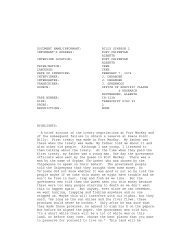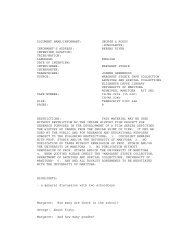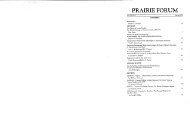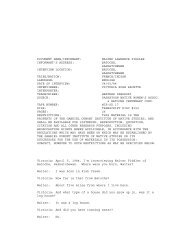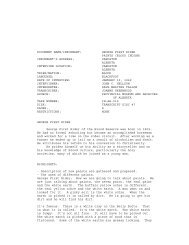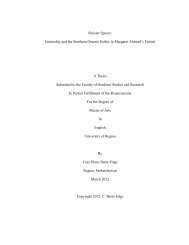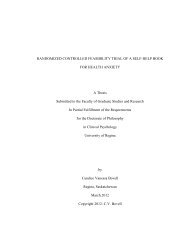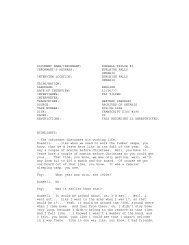document name/informant: fine day #14 informant's address - DSpace
document name/informant: fine day #14 informant's address - DSpace
document name/informant: fine day #14 informant's address - DSpace
You also want an ePaper? Increase the reach of your titles
YUMPU automatically turns print PDFs into web optimized ePapers that Google loves.
Coat made with peaked parkee attached. Open down front and<br />
fastened with saganapi -- knee length -- also belt of saganapi.<br />
No pockets, sleeves sewn in. The women measure the fellow<br />
that's going to wear it so that it will fit him.<br />
Fine Day never saw any rabbit skin clothing.<br />
Mica-hatato-paihiwiu -- "Many go fighting."<br />
This is what big war parties were called. They were undertaken<br />
so that the ukimau who was the leader would get a bigger <strong>name</strong>.<br />
The scouts go out to locate a camp and all approach at night.<br />
The ogihtcitau watch so that no one goes ahead. But sometimes<br />
the ogihtcitau will let their relatives go ahead and these men<br />
may get away with all the horses before the rest come up. They<br />
shoot and yell and attack, the enemy run. We chase and kill<br />
them and throw their tipi down. But soon the enemy gather in a<br />
group and they come back to fight. They can pick a good place<br />
but we are scattered. They kill many of us. When <strong>day</strong> comes we<br />
put the wounded on travois and go off. The ukimau doesn't<br />
fight. He sits back somewhere in a safe place and eats. The<br />
ogihtcitau come back and report how many they have killed.<br />
Then he tells them to stop. This is the leader -- if there are<br />
other ukimau along they fight right in front. He doesn't have<br />
to fight because he has fought many times before. If his men<br />
kill many of the enemy he gets to be a still greater ukimau.<br />
These large war parties were before my time. I saw them but I<br />
was too young to go along. Mihkwe-kiu, "Red Cloth," was one of<br />
the last leaders. He went against the Blackfeet. The next<br />
winter anutimi-wiyinu ka-stowe-skowa-t, "Stamps on Ashes," and<br />
ci-akask, "Growing," led expeditions. These were all chiefs but<br />
they were not as high as Sweet Grass.<br />
The leader would tell everybody that they were going and they<br />
could try to get as many men as possible. They might get 100<br />
men or even more. When they all get together they dance.<br />
The next <strong>day</strong> they dance again and the leader starts ahead with<br />
some other ukimauuk. They don't go very far and stop to make a<br />
fire and wait for the others. After they get warmed up they go<br />
on a little way and camp. That is the story I heard from the<br />
old people.<br />
Coup Counting<br />
Done in ogihtcitau tipi and in War Dance. Sometimes the<br />
different ogihtcitau tipis would get jealous of each other and<br />
have coup counting revelries. The ogihtcitau leader dances and<br />
tells his brave deeds. He tells them for the people there, not<br />
for manito.<br />
One man cannot count another's coup. But a son may recite his<br />
deceased father's deeds lest they be forgotten. Not long ago a<br />
nutimiwiyinu did that at a Sundance. He told the story and<br />
said, "My father did that, not I." His four brothers gave a



